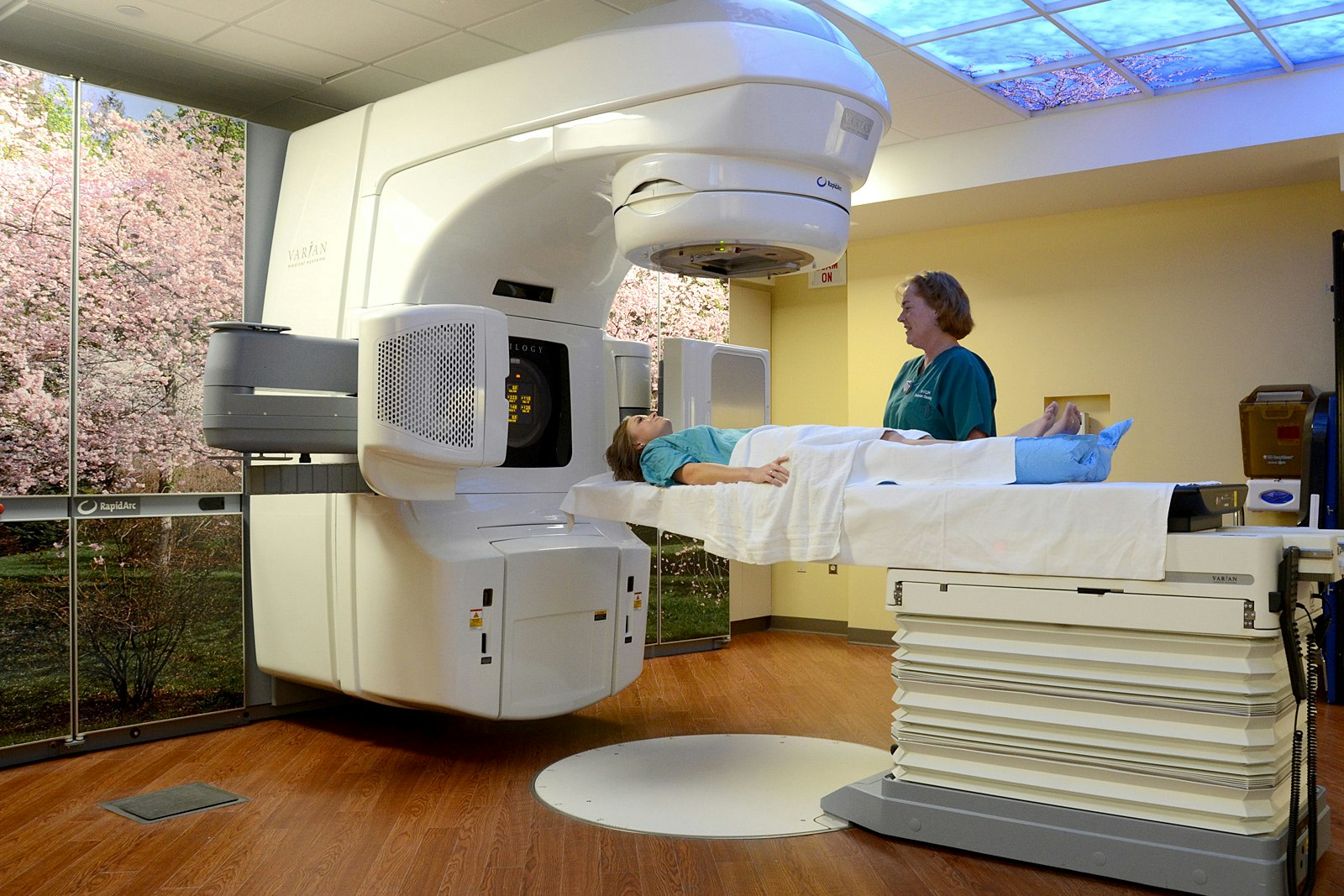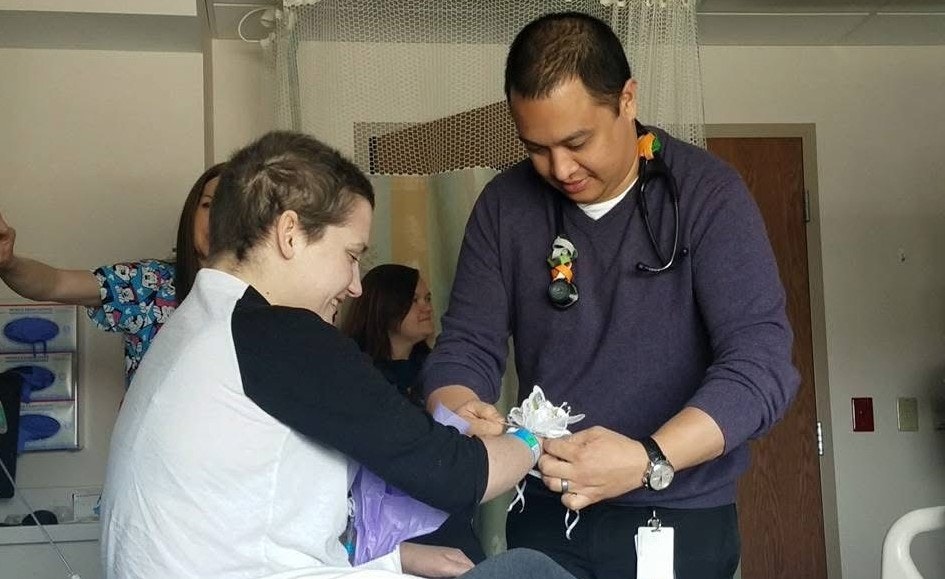The peritoneum is the thin tissue that lines your abdominal wall. It covers most of the organs in your abdomen, including the uterus, bladder, and rectum. When abnormal epithelial cells grow out of control in the peritoneum, it can turn into peritoneal cancer. This is a rare cancer and is not the same as stomach, intestinal, or ovarian cancer. Peritoneal cancer is more common in women and is similar to ovarian cancer because the ovaries also have epithelial cells.
Our peritoneal cancer specialists and gynecologic oncologists at the WVU Cancer Institute diagnose and treat all forms of peritoneal cancer, including primary peritoneal cancers of Mullerian origin. Services and programs are provided in state-of-the-art facilities by a team that understands that cancer is physically and emotionally challenging. A cancer diagnosis is never easy to hear, but at the WVU Cancer Institute, patients have access to some of the nation’s best in cancer care. It’s where you’ll find hope, compassionate care, and the expertise you need to treat cancer.
Types of Peritoneal Cancers We Treat
The WVU Cancer Institute specializes in evaluating and treating primary and secondary peritoneal cancers. Our comprehensive team brings together board-certified surgeons, specialists from gynecology, gastroenterology, medical oncologists, gynecologic oncologists, radiation oncologists, highly trained nurses, radiologists, and pathologists with expertise in peritoneal cancer. We work to make sure your treatment is customized to your specific type of cancer and your needs.
Several different types of peritoneal cancers start in the peritoneum. Our team has expertise in diagnosing and treating tumors, including:
- Peritoneum epithelial cancer – This is a rare cancer that lines the inside wall of the abdomen.
- Desmoplastic small round-cell tumors – These are soft tissue sarcomas that form in the abdomen and pelvic area.
- Peritoneal mesothelioma – This is a rare cancer that starts in the lining of the body.
- Secondary peritoneal cancers – These cancers start in other organs in the abdomen and spread to the peritoneum. They can include gynecologic cancer and cancer of the stomach, small bowel, colon, or appendix.
Diagnosing Peritoneal Cancers
There are different ways to diagnose peritoneal cancer. However, like ovarian cancer, this type of cancer is hard to detect in the early stages. This can make it difficult to diagnose early. You should talk with your doctor if you notice any new symptoms, such as abdominal pain, feeling full after a light meal, frequent urination, abnormal vaginal or rectal bleeding, or loss of appetite.
We use the latest diagnostic tests to diagnose peritoneal cancer and create a personalized plan for your care. These diagnostic tools include:
- Advanced imaging — Doctors use the latest technology, including transvaginal ultrasound, computed tomography (CT), magnetic resonance imaging (MRI), and positron emission tomography (PET) scans, to detect signs of disease and see whether cancer has spread to other parts of the body, such as the lymph nodes.
- Barium enema — This test is also called a lower GI series. It uses a barium-containing solution that coats the lining of the colon, rectum, stomach, and intestines. Then it helps show abnormalities within the lining of these organs.
- Biopsy — If an imaging test shows an abnormal area, doctors can biopsy tissue and examine it under a microscope to learn whether cancer is present. During a biopsy, a doctor removes a small sample of tissue at the site to analyze in a lab. Biopsy results help oncologists plan the best treatment for you. Several different biopsy types include image-guided biopsy and fine-needle aspiration.
- Endoscopic procedures — Doctors use a thin, flexible, lighted tube (endoscope) with a camera to examine the lining of the abdominal organs. Small tissue samples can be biopsied through the endoscope. There are different types of endoscopic tests, including colonoscopy and sigmoidoscopy.
- Lab and tumor marker tests — To help plan for treatment, certain lab tests look at any changes in genes, chromosomes, or proteins. We use a tumor marker test called CA-125 to measure levels of a chemical in the blood that may indicate a risk for ovarian or peritoneal cancer. We can also use a newer blood marker test called HE4.
- Laparoscopy — This is also called laparotomy and is a minimally invasive procedure that looks directly at the peritoneum.
- Pelvic exam — A pelvic exam is an internal exam that evaluates the abdomen, uterus, ovaries, and rectum. This test can help determine an organ’s health, size, shape, and position.
- Physical exam — Doctors conduct a health history and use a physical exam to look for signs of something going on in your body, such as the presence of a tumor. Your doctor may recommend exams to check the health of the uterus, vagina, ovaries, fallopian tubes, stomach, bladder, colon, and rectum.
- Upper GI series — This test uses a barium-containing solution that is swallowed and coats the stomach and the first part of the small intestine. It can help show abnormalities within the lining of these organs.
Treatment for Peritoneal Cancers
From your first visit, our team works with you to address your specific condition and needs. Our goal is to treat cancer at its earliest stage. Because this isn’t always possible with peritoneal cancer, our goal is to form a plan to remove cancer when possible or prevent cancer from growing. Your treatment approach will depend on the type of tumor and its stage. Your care plan may include:
- Systemic therapy: medical oncology and targeted therapy – Medical oncology includes chemotherapy, immunotherapy, and hormone therapy. Our doctors use the latest anti-cancer medicines to destroy cancer cells. We also use medicines to slow cancer growth and shrink tumors before surgery. Sometimes we use medication alongside other treatments, such as radiation, or after surgery to destroy any cancer cells that might remain. Often medicines that are used to treat peritoneal cancer are similar to those used for ovarian cancer. Our medical oncologists can also deliver chemotherapy directly into the abdomen through a catheter, called intraperitoneal chemotherapy. When using targeted therapy, our doctors send medicine and fluids through a catheter into your bloodstream. We use targeted therapy, which is different than chemotherapy, to treat some types of advanced primary peritoneal cancer. Targeted therapies, such as PARP and monoclonal antibodies, target cancer cells without harming normal cells.
- Hyperthermic intraperitoneal chemotherapy – This type of chemotherapy, also called HIPEC, is heated chemotherapy delivered directly into the peritoneum after surgery. It may be an option when cancer has spread to the peritoneum from the appendix, colon, or stomach.
- Palliative surgery – Our surgeons use different palliative surgery approaches when cancer has spread and cannot be removed. These surgeries can relieve symptoms and improve quality of life.
- Radiation oncology – We use radiotherapy treatments to target, destroy, and shrink cancer. The treatments use a linear accelerator to produce precise, high-energy rays that target the exact area of cancer and spare healthy cells.
- Surgery – Surgery can help us diagnose, stage, and treat many tumors. We use surgery to take a biopsy of a tumor or to help prevent or treat symptoms. Our surgical oncologists and gynecologic surgeons can perform surgery, depending on the origin of the disease, to remove any visible signs of cancer in the abdomen and any affected organs, including the ovaries, fallopian tubes, uterus, and other tissue and organs. We also offer complex surgery called cytoreductive surgery or tumor debulking. It works well as a treatment for certain people with peritoneal surface cancer.
Resources for Peritoneal Cancers
We believe cancer care goes beyond the medical diagnosis and treatment. That’s why you can access many resources that may help answer questions and connect you to others.





